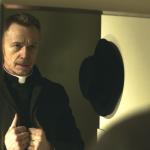Chisolm
Unlike Horne, this warrant officer (Denzel Washington) and unquestioned leader of the Magnificent Seven never really talks about his faith. It’s only at the very end of the story that we see that Christianity means something to him.
The climactic battle is over. Dead litter the ground, and Chisolm and Bogue face each other, the burned-out church looming over the both of them. Chisolm shoots Bogue in the leg: Bogue falls to the ground and crawls into the church, saying a prayer as he goes—using religion as cover to the last.
Chisolm hesitates in the doorway and takes off his hat, seeming uncertain whether he should finish Bogue off in a holy place. Indeed, the showdown takes us back to the movie’s very beginning, when the preacher tells Bogue and his men that “this is the Lord’s house—no place for guns.” So it’s interesting that Chisolm strides into the church and instead seems determined to strangle Bogue to death.
“Pray with me,” he tells a terrified Bogue. “Ask for forgiveness.” And in this moment, it seems as though the movie paints Chisolm as an angel of death—a man serving as God’s righteous fist, coming down on hard on someone who so richly deserves retribution. The fact that the last scene takes place in the church—the church Bogue himself burned—serves to cinematically sanctify the act.
It’s an interesting scene, but one I can’t personally accept as just. I have a hard time seeing God’s hand in such a torturous scene, no matter how much Bogue might seem to deserve it. It’s easier for me to see the beauty of faith not in taking a life, but in giving it … as we’ll see on the next page.














